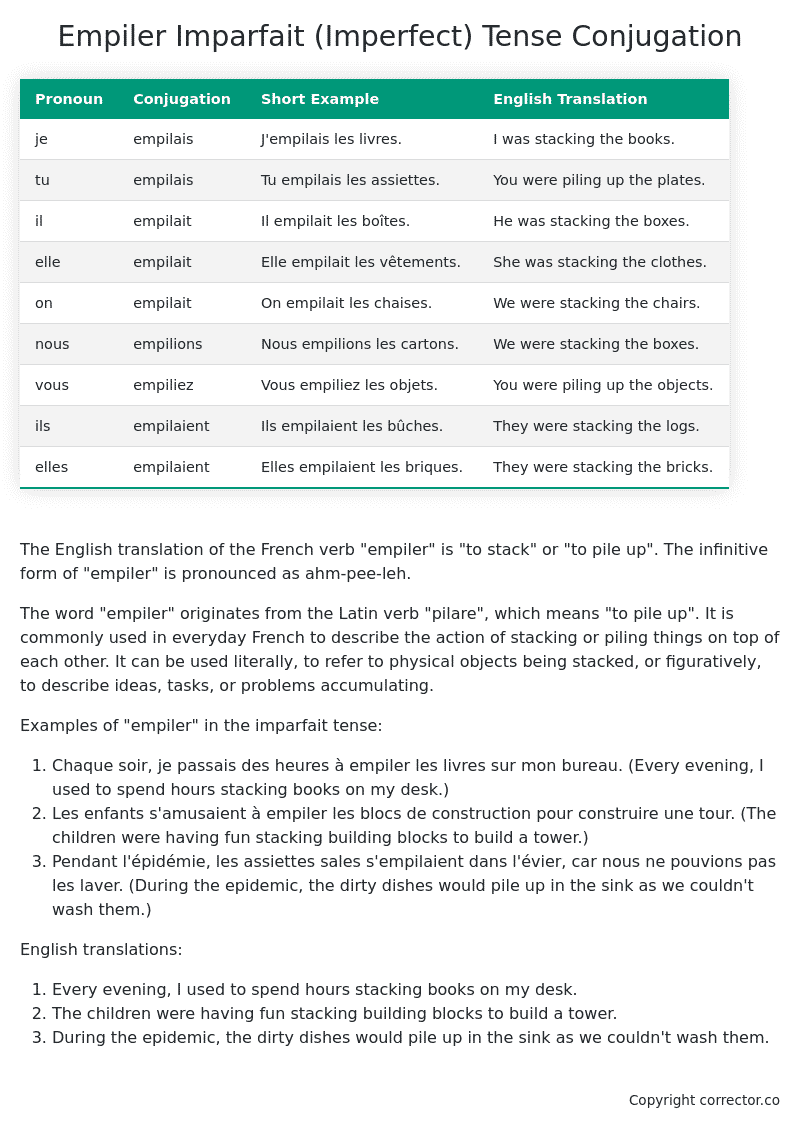Imparfait (Imperfect) Tense Conjugation of the French Verb empiler
Introduction to the verb empiler
The English translation of the French verb “empiler” is “to stack” or “to pile up”. The infinitive form of “empiler” is pronounced as ahm-pee-leh.
The word “empiler” originates from the Latin verb “pilare”, which means “to pile up”. It is commonly used in everyday French to describe the action of stacking or piling things on top of each other. It can be used literally, to refer to physical objects being stacked, or figuratively, to describe ideas, tasks, or problems accumulating.
Examples of “empiler” in the imparfait tense:
- Chaque soir, je passais des heures à empiler les livres sur mon bureau. (Every evening, I used to spend hours stacking books on my desk.)
- Les enfants s’amusaient à empiler les blocs de construction pour construire une tour. (The children were having fun stacking building blocks to build a tower.)
- Pendant l’épidémie, les assiettes sales s’empilaient dans l’évier, car nous ne pouvions pas les laver. (During the epidemic, the dirty dishes would pile up in the sink as we couldn’t wash them.)
English translations:
- Every evening, I used to spend hours stacking books on my desk.
- The children were having fun stacking building blocks to build a tower.
- During the epidemic, the dirty dishes would pile up in the sink as we couldn’t wash them.
Table of the Imparfait (Imperfect) Tense Conjugation of empiler
| Pronoun | Conjugation | Short Example | English Translation |
|---|---|---|---|
| je | empilais | J’empilais les livres. | I was stacking the books. |
| tu | empilais | Tu empilais les assiettes. | You were piling up the plates. |
| il | empilait | Il empilait les boîtes. | He was stacking the boxes. |
| elle | empilait | Elle empilait les vêtements. | She was stacking the clothes. |
| on | empilait | On empilait les chaises. | We were stacking the chairs. |
| nous | empilions | Nous empilions les cartons. | We were stacking the boxes. |
| vous | empiliez | Vous empiliez les objets. | You were piling up the objects. |
| ils | empilaient | Ils empilaient les bûches. | They were stacking the logs. |
| elles | empilaient | Elles empilaient les briques. | They were stacking the bricks. |
Other Conjugations for Empiler.
Le Present (Present Tense) Conjugation of the French Verb empiler
Imparfait (Imperfect) Tense Conjugation of the French Verb empiler (You’re reading it right now!)
Passé Simple (Simple Past) Tense Conjugation of the French Verb empiler
Passé Composé (Present Perfect) Tense Conjugation of the French Verb empiler
Futur Simple (Simple Future) Tense Conjugation of the French Verb empiler
Futur Proche (Near Future) Tense Conjugation of the French Verb empiler
Plus-que-parfait (Pluperfect) Tense Conjugation of the French Verb empiler
Passé Antérieur (Past Anterior) Tense Conjugation of the French Verb empiler
Futur Antérieur (Future Anterior) Tense Conjugation of the French Verb empiler
Subjonctif Présent (Subjunctive Present) Tense Conjugation of the French Verb empiler
Subjonctif Passé (Subjunctive Past) Tense Conjugation of the French Verb empiler
Subjonctif Imparfait (Subjunctive Imperfect) Tense Conjugation of the French Verb empiler
Subjonctif Plus-que-parfait (Subjunctive Pluperfect) Tense Conjugation of the French Verb empiler
Conditionnel Présent (Conditional Present) Tense Conjugation of the French Verb empiler
Conditionnel Passé (Conditional Past) Tense Conjugation of the French Verb empiler
Conditionnel Passé II (Conditional Past II) Tense Conjugation of the French Verb empiler
L’impératif Présent (Imperative Present) Tense Conjugation of the French Verb empiler
L’impératif Passé (Imperative Past) Tense Conjugation of the French Verb empiler
L’infinitif Présent (Infinitive Present) Tense Conjugation of the French Verb empiler
L’infinitif Passé (Infinitive Past) Tense Conjugation of the French Verb empiler
Le Participe Présent (Present Participle) Tense Conjugation of the French Verb empiler
Le Participe Passé (Past Participle) Tense Conjugation of the French Verb empiler
Struggling with French verbs or the language in general? Why not use our free French Grammar Checker – no registration required!
Get a FREE Download Study Sheet of this Conjugation 🔥
Simply right click the image below, click “save image” and get your free reference for the empiler imparfait tense conjugation!

Empiler – About the French Imparfait Tense
NOTE: To take a deep dive into all the French tenses then see our article on Mastering French Tense Conjugation.
Formation of the Imparfait Tense
For regular -er verbs:
For regular -ir verbs
For regular -re verbs
Common Everyday Usage Patterns
Description of Past Habits
Background Information
Mental and Emotional States
It’s employed to express emotions, thoughts, or physical sensations in the past. For example: “J’étais content quand il est arrivé.” (I was happy when he arrived.)
Ongoing Actions
Points to Note About the Imparfait Tense
Passé Composé vs. Imparfait
Conditional
Si Clauses
Narration
I hope you enjoyed this article on the verb empiler. Still in a learning mood? Check out another TOTALLY random French verb imparfait conjugation!


